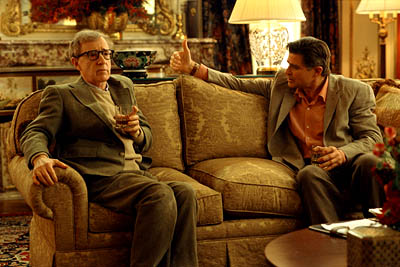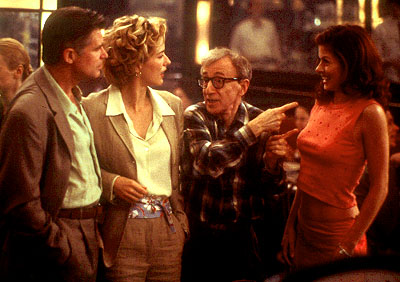

Few things in life are as consistent as Woody Allen. Every year or two he pumps out a new movie. However, with his consistent work ethic comes a consistency in quality. Most of what he does lately is about the same. Not many are a lot better, and not many are a lot worse. Compared to most other directors, all Allen films are superior, but Allen also must compare himself to his vast library of work. In other words, it's getting a little old. In Hollywood Ending, Allen plays the same, nervous, neurotic man he always does. He still gets the gorgeous woman, and the script is still full of neat one-liners. The difference, is that as Allen starts getting on in age, it starts getting increasingly ridiculous and tiresome. Here, Allen (The Curse of the Jade Scorpion, Small Time Crooks) gets not one beautiful lady, but two; Tea Leoni and Debra Messing (in fact, it's almost three with Tiffani Thiessen).
Allen films are also sometimes semi-autobiographical. What that says about him here is debatable. Is this a wry look at his career or a desperate cry for help? Allen is Val Waxman, a Hollywood director well beyond his prime. He has Oscars and a reputation for being hard to work with, so he has no work. One last chance at redemption (personal and public) comes from his ex-wife Ellie (Leoni, Jurassic Park III, The Family Man). She thinks he is perfect to direct a movie she wrote. The catch is that they had a bitter break up when she left Val for Hal (Treat Williams, Critical Mass, The Deep End of the Ocean), who just happens to be the head of the studio making the movie. Val's agent Al (Mark Rydell, James Dean, Havana) wants Val to participate, but Val is extremely nervous (well, more nervous than usual). Yes, the names rhyme. No, it's not funny. Val becomes psychosomatically blind because he is so nervous. Still, this is his last chance so he refuses to tell anybody. Instead, using Al and his cameraman's translator (Barney Cheng, Rollerball, Exceed) as his eyes, Val proceeds to shoot the film blind.
The joke is that sometimes, a blind person can make a film better than some of the junk Hollywood puts out nowadays. Also that because Val is an auteur, people trust his judgement although his direction makes no sense to anybody. Allen pummels this point into the viewer. The joke is clear, and he beats it until it is dead. Many of the Hollywood stereotypes are present, but they really don't add anything to the film. Messing (The Mothman Prophecies, Jesus) plays Lori, Val's much younger and attractive girlfriend who cannot act. Val still casts her in the film. George Hamilton (Crocodile Dundee in Los Angeles, Pets) plays a studio executive who seems to show up every once in a while. This has all the earmarks of a Woody Allen film, but there is nothing that stands out about it to make it any better than any of his other ones.
Nothing in Hollywood Ending is particularly new or original. When Ellie begins to have second thoughts about leaving Val, it plays tediously and predictably. Like all Allen movies, the look of the film is great (even though it takes place in the present) and the acting, for the most part is good. The most annoying element of the film centers on Val's blindness. He is blind, not deaf. Yet, Allen insists on staring blankly into space like he is both. This is most likely for effect, but makes no sense in some scenes. Like when Val and Al are speaking in a hotel room: They are sitting next to each other on the couch and Al is talking, yet Val looks off in another direction and nods his head. It is just too distracting, and sometimes more interesting, to look at how it measures up to Allen in real life. He has a Chinese cinematographer in the film, and uses Zhao Fei in real life (although Zhao didn't work on this film). Val loves New York and working in New York, as does Allen. Both are a part of Hollywood Ending, which may not necessarily be a good thing.